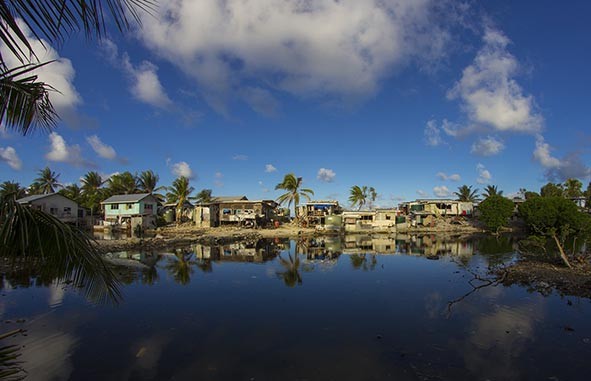
Pacific Island countries, some of which rise just a few meters above sea level, comprise one of the most vulnerable regions in the world to climate change. The nature-based livelihoods and diverse cultures of these island nations are being challenged, and in some cases overwhelmed, by rising sea levels, air and ocean temperatures, acidification, and shifting rainfall and storm patterns - effects of climate change that are projected to worsen over the next 100 years.
OVERVIEW
Through C-CAP, USAID supports local-level climate change interventions in nine Pacific Island countries:, Fiji, Kiribati, Nauru, Papua New Guinea (PNG), Samoa, Solomon Islands, Tonga, Tuvalu, and Vanuatu. In 77 communities in these countries, USAID is working to increase local knowledge and adaptive capacity through community-based training. When applied, these forward-looking interventions will increase the resilience of Pacific Island coastal communities to the projected impacts of climate change.
Rehabilitating and constructing new, small-scale community infrastructure
C-CAP is leading coastal communities through a participatory process to: identify current and projected climate change impacts; map existing community infrastructure assets; prioritize infrastructure-related adaptation needs; and implement infrastructure adaptations designed to structurally withstand the impacts of climate change and functionally increase community resilience to climate change. Through risk mapping and vulnerability assessment activities, communities develop awareness of climate change adaptation issues and approaches and acquire fundamental decision-making skills, setting them on a course to proactively manage their climate change risks and adaptation interventions beyond the duration of the project.
Building capacity for community engagement for disaster prevention and preparedness
USAID is helping coastal communities build upon their existing and traditional disaster management approaches and adopt new strategies intended to mitigate risks presented by the region’s new and predicted climate reality. New risk management strategies may involve implementation of disaster drills and other risk mitigation exercises, as well as building of networks that link communities to national and regional disaster management services.
IMPLEMENTATION PROGRESS AND ACCOMPLISHMENTS
As C-CAP nears completion of its third year, USAID has implemented risk identification, capacity building, infrastructure adaptation, and disaster preparedness in 77 communities across Fiji (10), PNG (10), Samoa (10), Tonga (10), Vanuatu (10), Kiribati (5), Tuvalu (2), and Solomon Islands (10). In Nauru, C-CAP is working with the national government to provide an island-wide water management project.
C-CAP’s decision support tool for adaptation of community assets- the Infrastructure Prioritization Index (IPI) - is positioning communities to methodically analyze asset vulnerability to climate change and identify their highest-priority infrastructure needs for adaptation. By using the tool, the majority of communities have already agreed upon their priority adaptation infrastructure interventions, which include drainage and flood control system upgrades, rainwater catchment system improvements, cyclone-proofing of community buildings, and coastal protection and erosion control projects. The design, tendering and construction of identified activities is well underway, and many communities have already completed their infrastructure projects. By the end of the project, all 77 communities will take ownership of this decision-support tool and be able to continue using it as their adaptation needs evolve.
As the C-CAP team completes infrastructure adaptation projects and disaster preparedness and response plans across its partner communities, USAID is expanding the reach and use of C-CAP’s cutting-edge adaptation resources and tools across nine Pacific Island countries to make them more resilient to the adverse impacts of climate change.







Comment
Make a general inquiry or suggest an improvement.